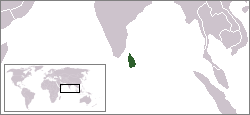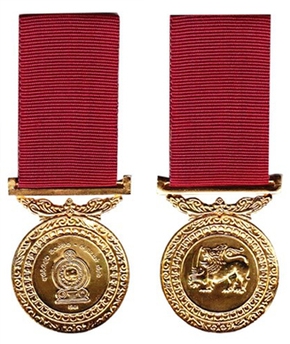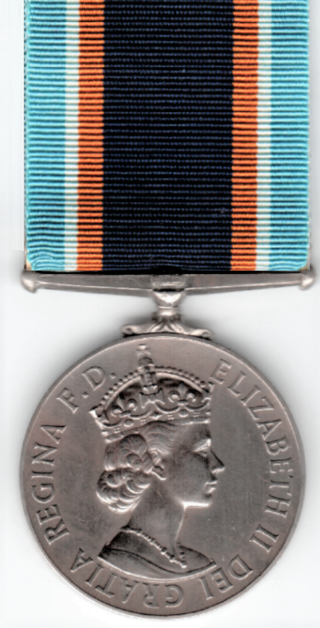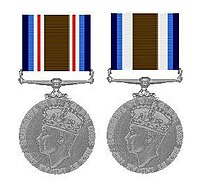
The 1958 anti-Tamil pogrom and riots in Ceylon, also known as the 58 riots, refer to the first island-wide ethnic riots and pogrom to target the minority Tamils in the Dominion of Ceylon after it became an independent dominion from Britain in 1948. The riots lasted from 22 May until 29 May 1958 although sporadic disturbances happened even after the declaration of emergency on 27 May 1958. The estimates of the murders range, based on recovered bodies, from 158 to 1,500. Although most of the victims were Tamils, Sinhalese and their property were also affected by retaliatory attacks by Tamil mobs throughout the Batticaloa and Jaffna districts. As the first full-scale race riot in the country in over forty years, the events of 1958 shattered the trust the communities had in one another and led to further polarisation.

The Sri Lankan Armed Forces award medals and their associated ribbon bars in recognition of various levels of service, personal accomplishments and commemorative events while a regular- or volunteer serviceperson is a member of the Sri Lanka Army, Sri Lanka Navy and the Sri Lanka Air Force. Together with military badges, such awards are a means to outwardly display the highlights of a serviceperson's career.

The Parama Weera Vibhushanaya (PWV) is Sri Lanka's highest military decoration, awarded for acts of exceptional valour in wartime. Parama Weera Vibhushanaya translates as the "Order of the Supreme Valour", and the award is granted for "individual acts of gallantry and conspicuous bravery of the most exceptional order in the face of the enemy". Corporal Gamini Kularatne, was the first recipient. As of January 2021, the medal has been awarded 31 times, of which all were posthumous and arose from actions in the Sri Lankan Civil War. Of the 31 awardees, 28 have been from the Sri Lanka Army, two have been from the Sri Lanka Navy and one has been from the Sri Lanka Air Force.

The Weerodara Vibhushanaya is the second-highest decoration awarded by the Military of Sri Lanka awarded for:
...individual acts of gallantry and conspicuous bravery of a non-military nature of the most exceptional order performed voluntarily with no regard to his own life and security with the objective of saving or safeguarding the life or lives of a person or personnel imperiled by death or for a meritorious act or a series of acts of a humane nature of an exceptional order displayed in saving life from drowning, fire and rescue operations in mines, floods and similar calamities under circumstances of grave bodily injury or great danger to the life of the rescuer...

Admiral of the Fleet Wasantha Kumar Jayadeva Karannagoda, RSP, VSV, USP, MRIN, MNI is a Sri Lankan naval officer. He served as the Commander of the Sri Lankan Navy during the last phase of the Sri Lankan Civil War and Governor of North Western Province, Sri Lanka from 2021 to 2023.

The current decorations and medals of the Sri Lanka Police were adapted from those of the Dominion of Ceylon in 1972 when Sri Lanka became a republic.
The Karyakshama Seva Padakkama is a service medal awarded by the Military of Sri Lanka to all servicepersons of the Sri Lanka Army Volunteer Force in recognition of "...long, meritorious, loyal and valuable service of proven capacity". Established on 7 January 1986, the medal does not confer any individual precedence.

The Prashansaniya Seva Vibhushanaya is a military decoration awarded to officers of the Sri Lanka Volunteer Naval Force in recognition of excellent service. Inaugurated on 31 January 2000, the medal does not confer any individual precedence. It is equivalent to the Reserve Decoration of the Royal Navy, volunteer officers of the Ceylon Royal Naval Volunteer Reserve had been awarded the Decoration for Officers of the Royal Naval Volunteer Reserve from 1938 to 1950.
The Prashansaniya Seva Padakkama is a medal awarded by the Military of Sri Lanka to all noncomissioned officers and seamen of the Sri Lanka Volunteer Naval Force in recognition of "long, meritorious, loyal, valuable, service and unblemished conduct". It was established on 31 January 2000, and does not confer any individual precedence. Other ranks of the Ceylon Royal Naval Volunteer Reserve had been awarded the Royal Naval Volunteer Reserve Long Service and Good Conduct Medal from 1938 to 1950.

Sri Lanka Police is the civilian national police force of the Democratic Socialist Republic of Sri Lanka. The police force is responsible for enforcing criminal and traffic law, enhancing public safety, maintaining order and keeping the peace throughout Sri Lanka. The police force consists of 43 Territorial Divisions, 67 Functional Divisions, 432 Police Stations with more than 84,000 people. The professional head of the police is the Inspector General of Police who reports to the Minister of Law and Order as well as the National Police Commission. The last Inspector General of Police was Deshabandu Tennakoon. The Acing Inspector General of the Police is currently Senior DIG Priyantha Weerasooriya, who was appointed on September 27, 2024

Major General Janaka Perera, RWP, RSP, VSV, USP, VSP was a Sri Lankan General and politician. He served as the Chief of Staff of the Sri Lanka Army and is considered one of the most distinguished generals in Sri Lankan history. After retiring from the army he served as a Sri Lankan High Commissioner to Australia and Ambassador to Indonesia. He was the opposition leader of the North Central Provincial Council until he and his wife were killed on 6 October 2008 by a suicide bomber. The LTTE have been blamed for the bombing by Sri Lankan president Mahinda Rajapaksa.
Cyril Cyrus "Jungle" Dissanayake, MVO was a Sri Lankan senior police officer. He was serving as Deputy Inspector-General of Police of Range I, when he was implicated as one of the leaders of the attempted military coup of 1962.

Air Vice Marshal P.B. Premachandra is a highly decorated senior Sri Lankan Air Force officer, who served as the Chief of Staff of the Sri Lanka Air Force.

General Ganegoda Appuhamelage Don Granville Nalin Seneviratne, VSV was a Sri Lanka Army general. He was the Commander of the Sri Lankan Army from 1985 to 1988 and first Governor of the North East Province.
The Janadhipathi Police Weeratha Padakkama is awarded to police officers in Sri Lanka for gallantry or brave performance of duty. It is awarded by the President of Sri Lanka on the recommendations of the Inspector General of Police (IGP). The medal replaced the Queen's Police Medal which was awarded until Ceylon became a Republic in 1972.
The Sri Lanka Police Weeratha Padakkama is awarded to police officers in Sri Lanka for gallantry or brave performance of duty. It is awarded by the Inspector General of Police (IGP). The medal replaced the Ceylon Police Medal for Gallantry which was awarded until Ceylon became a Republic in 1972.
The Sri Lanka Police Vishishta Seva Padakkama is awarded to senior police officers in Sri Lanka for Meritorious Performance of Police duties. It is similar to the Vishista Seva Vibhushanaya of the Sri Lanka Armed Forces. The medal replaced the Ceylon Police Medal for Meritorious Service which was awarded until Ceylon became a Republic in 1972.

The Ceylon Police Long Service Medal was awarded to police officers in Ceylon of and below the rank of Chief Inspector for completing 18 years of unblemished service. Bars for 25 and 30 years service were also awarded.
General Gerard Hector "Gerry" de Silva, RWP, VSV, USP was a senior Sri Lanka Army officer. He is the 5th Chancellor of General Sir John Kotelawala Defence University since 20 January 2020. He was the 13th Commander of the Sri Lankan Army and Sri Lankan High Commissioner to Pakistan.

Admiral Piyal De Silva, WWV & Bar, RWP, RSP, VSV, USP is a former senior Sri Lankan naval officer. He was the Commander of the Sri Lankan Navy from 2019 to 2020.













